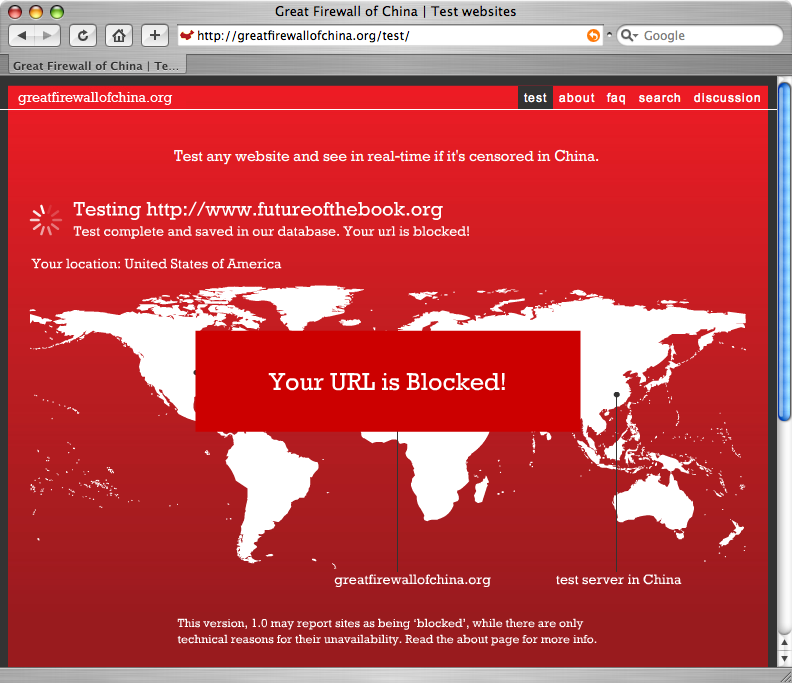I found an interesting project that performs real time tests on websites to determine wether they are blocked by China’s “Great Firewall” and I was (somewhat) surprised to find that our very own blog was filtered:

Our ideas are considered subversive by the Chinese government! We must be must be doing something right (edit: see comments below)!
Any of our readers find their own sites blocked?
Monthly Archives: April 2007
follow the eyes: screenreading reconsidered (again)
From Editor&Publisher (via Print is Dead): The Poynter Institute just released findings from a study in which eye-tracking sensors were used to analyze the behavior of 600 readers across print and online news sources. The resulting data clashes with the usual assumptions:
When readers chose to read an online story, they usually read an average of 77% of the story, compared to 62% in broadsheets and 57% in tabloids…
The study looked at two tabloids, the Rocky Mountain News and Philadelphia Daily News; two broadsheets, the St. Petersburg Times and The Star-Tribune of Minneapolis; and two newspaper Web sites, at the Times and Star-Tribune.
Considering the increasingly disaggregated nature of people’s news-sifting, is “two newspaper websites” really the right test bed for gauging online reading habits? Still, this is a pretty interesting, myth-busting find, though in a way not at all surprising.
This takes us back to the discussion around Cory Doctorow’s recent piece betting on the long-term persistence of print for certain kinds of reading. Print reading, he says, tends toward the sustained and immersive, the long-form linear narrative. Computer reading, on the other hand, is multi-tasky — distracted, social, bite-sized, multidirectional. One could poke a lot of holes in these characterizations, but generally speaking, they do sum up the way in which many of us divide our reading labor (and leisure) across “platforms.” Contrary to popular belief, Doctorow argues, people do like reading on screens. But they also like reading from printed pages. It’s not either/or — the different modes of reading reinforce the different modes of conveyance, paper and PC.
I’ve tended to agree, but many of the folks in the comments here didn’t. They insisted that it’s only a matter of time before we’ll be doing the vast majority of our reading on screens — even the linear, immersive reading that seems most resistant to digital migration. Getting past my own deep attachment to print, and reckoning with how far into daily practice electronic reading has already penetrated in so little time, I have to admit that this is probably true, though I imagine print will likely persist for at least a few more generations, and will always have its uses (and will hopefully be kept as a contingency reserve in case the lights go out).
Ultimately, this is a boring game, betting on which technology will win out. But it’s interesting sometimes to analyze what motivates certain big cultural actors to wager the way they do.
If you think about it, it makes a lot of sense that Doctorow, generally an advocate for new technologies, wants to see print survive, and why despite his progressive edge, he’s a bit of a traditionalist. As a novelist, Doctorow is deeply invested in the economic model of print. That’s the way he actually sells books (and probably the way he likes to read them). And yet he grasps the Internet’s potential to leverage print — his career as a writer took off at precisely the moment when these two worlds entered into a complex symbiosis. As such, he has long been evangelizing the practice of giving away e-books to sell more print books, pointing to his own great success as proof of the hybrid concept.
At the surreal Google conference I attended at the New York Public Library in January, Doctorow took the stage as mollifier-in-chief, soothing the gathered representatives of the publishing industry with assurances that print is here to stay, is in fact reinforced by new online discovery tools like Google Book Search and free e-versions (which he suggests are used primarily for browsing or “market research”). All of this is right and true — for now — and Doctorow’s advice to publishers to loosen up and embrace the Web as a gateway toward offline reading experiences, and as a way to socially situate their texts on the network is good advice, but it doesn’t necessarily shed light on the longer term. The Poynter study, in its crude way, does.
Net-native writing will always be for a distracted audience, print for a captivated one, says Doctorow. He’s comfortable with that split. And I guess I’ve been too, suggesting as it does two sorts of knowledge, neither of which we’d want to lose. But the gap will almost certainly narrow, and figuring out the consequences of that is certainly one of our biggest challenges.
the situation with sophie
Someday this week we”ll post an alpha version for people to try out — check here for the announcement. This version won’t have a standalone reader and has lots of bugs but the file format is solid and you can start making real books with it. Our schedule for future releases is as follows.
June — a more robust version of the current feature set
August — a special version of Sophie optimized for the OLPC (aka $100 laptop or XO) in time for the launch of the first six million machines
September — a beta version of Sophie 1.0 which will include the first pass at a Sophe reader
December — release of Sophie 1.0
